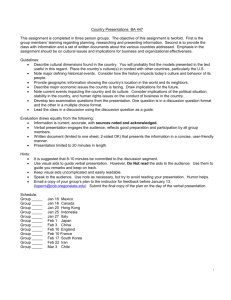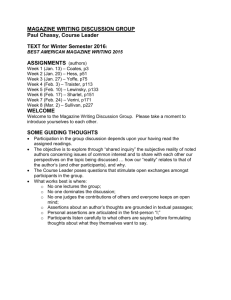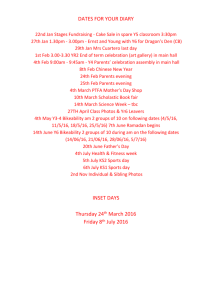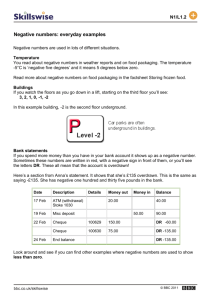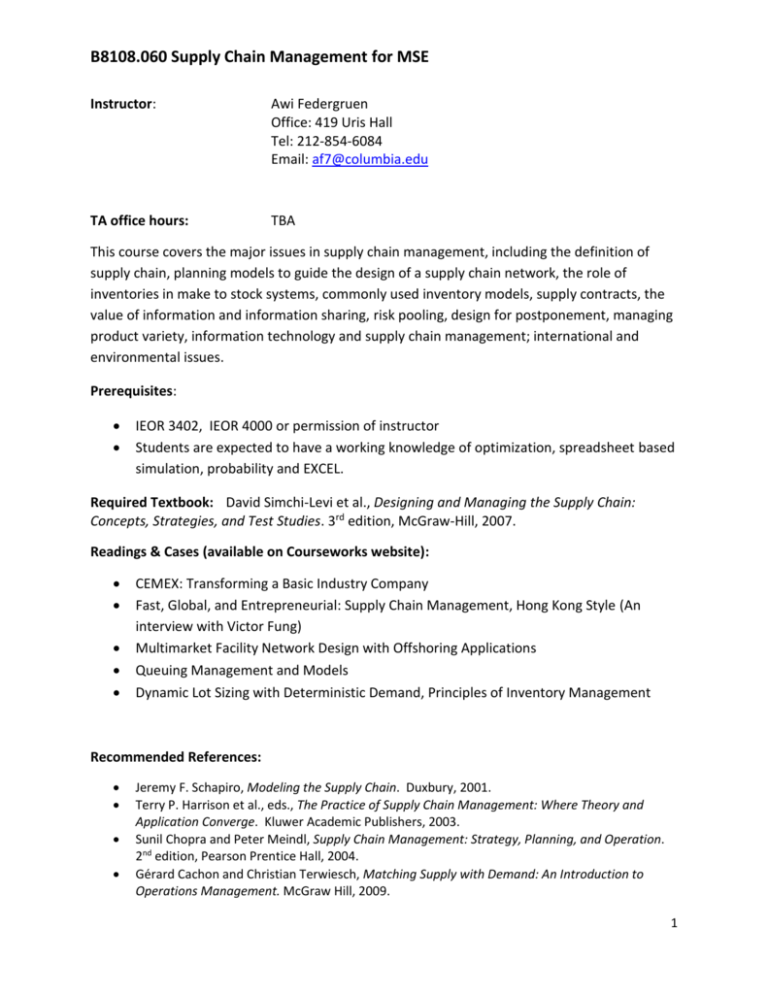
B8108.060 Supply Chain Management for MSE
Instructor:
Awi Federgruen
Office: 419 Uris Hall
Tel: 212-854-6084
Email: af7@columbia.edu
TA office hours:
TBA
This course covers the major issues in supply chain management, including the definition of
supply chain, planning models to guide the design of a supply chain network, the role of
inventories in make to stock systems, commonly used inventory models, supply contracts, the
value of information and information sharing, risk pooling, design for postponement, managing
product variety, information technology and supply chain management; international and
environmental issues.
Prerequisites:
IEOR 3402, IEOR 4000 or permission of instructor
Students are expected to have a working knowledge of optimization, spreadsheet based
simulation, probability and EXCEL.
Required Textbook: David Simchi-Levi et al., Designing and Managing the Supply Chain:
Concepts, Strategies, and Test Studies. 3rd edition, McGraw-Hill, 2007.
Readings & Cases (available on Courseworks website):
CEMEX: Transforming a Basic Industry Company
Fast, Global, and Entrepreneurial: Supply Chain Management, Hong Kong Style (An
interview with Victor Fung)
Multimarket Facility Network Design with Offshoring Applications
Queuing Management and Models
Dynamic Lot Sizing with Deterministic Demand, Principles of Inventory Management
Recommended References:
Jeremy F. Schapiro, Modeling the Supply Chain. Duxbury, 2001.
Terry P. Harrison et al., eds., The Practice of Supply Chain Management: Where Theory and
Application Converge. Kluwer Academic Publishers, 2003.
Sunil Chopra and Peter Meindl, Supply Chain Management: Strategy, Planning, and Operation.
2nd edition, Pearson Prentice Hall, 2004.
Gérard Cachon and Christian Terwiesch, Matching Supply with Demand: An Introduction to
Operations Management. McGraw Hill, 2009.
1
Robert E. Hall, Digital Dealing: How E-Markets are Transforming the Economy. W.W. Norton &
Company, 2001.
A.G. de Kok and S.C. Graves. Eds., Supply Chain Management: Design, Coordination, and
Operation. Elsevier, 2003.
Game Assignment: Write-up Littlefield game (group assignment), due March 6 (5% grade)
Problem Assignments (You must turn in at least 6; you will be credited for the best 6 grades):
1.
2.
3.
4.
5.
6.
7.
8.
9.
Problem set 1: Deterministic continuous review models, due Feb 11
Problem set 2: Single period stochastic inventory problems, due Feb 18
Sports Obermeyer analysis, due Feb 20
Problem set 3: Make to order systems, due March 4
Problem set 4: Supply contracts, due March 11
Problem set 5: Multi-period stochastic inventory models, due March 25
Problem set 6: Multi-period non-stationary models, due April 8
Problem set 7: Inventory pooling, due April 15
Problem set 8: Network design problems, due April 29
Grading: Problem Sets
Final Exam
Midterm Exam
Littlefield game write-up (group assignment)
Participation
30%
30%
25%
5%
10%
Participation: For this course to be successful, everyone must participate in classroom
discussion. The participation grade is based on the instructor’s evaluation of the quality of each
student’s progress and contribution during the semester. You should note that, in general,
quality is more important than quantity.
Make-Up Exams: The instructor requires written documentation of the student’s reason for
missing the exam, as well as notification prior to the scheduled exam. If the instructor decides
that the reason for the absence is valid, the student will be scheduled for the make-up exam.
Re-Grading: If you feel that your performance has been under-evaluated, please resubmit your
work, along with a written statement directly to the course instructor, within seven days after
receiving your grades, explaining clearly why you feel that your grade should be adjusted.
Tentative schedule :
Jan 30: Introduction to Supply Chain Management
Feb4 - Feb 6: Introduction to inventory management: Deterministic Continuous Review models
Feb 11 - Feb 13: Managing Demand risks; Supply Contracts (Single sales season models)
Feb 18: Make to Order systems: queueing models
2
Feb 20: The value of reactive capacity: Sports Obermeyer case
Feb 25 - Feb 27: Multi-period inventory systems: linear procurement costs; the role of
forecasting in supply chain management
March 4: Multi-period inventory models: economies of scale in procurement costs
March 6: Littlefield supply chain game: discussion and analysis
March 11: Serial supply chains and the bull whip effect: an in-class Beer Game ( longer session
8:30AM-10:30AM)
Friday, March 15: Midterm (9AM -11AM, Warren 208)
March 18-22: SPRING BREAK
March 25 : The value of information and information sharing: discussion of the Beer game
and Barilla Spa case
March 27: (longer session: 8:30AM-10:30AM) guest lecture by Prof. Medini Singh: Role of IT in
Supply Chain Transformation; Virtual Integration; Value Chain Dissection
April 1: NO CLASS
April 3 - 8: Inventory pooling and supply chain integration; two echelon inventory systems
April 10 - 15: Supply chain design; design for postponement: the HP Deskjet case
April 17 - 22: Global sourcing; outsourcing
April 24-29: Supply chain network design models
TBD: Final exam
Readings:
Jan 30: Chapter 1
Feb 4-6: Chapter 2, pp.27-35
Feb 11-13: Chapter 2, pp.35-41, Chapter 4, pp. 123-125
Feb 18: Chapter 2, pp. 63-77
3
Feb 20: Queueing Models and management (posted)
Feb 25-27: Chapter 2, pp.45-48, 56-60
Mar 4: Multi-period inventory models: economies of scale in procurement costs; multi-period
inventory models with non-stationary parameters: handout (posted)
Mar 6: Littlefield supply chain game: discussion and analysis
Mar 11: Chapter 5, pp.143-161
Friday, March 15: Midterm (9AM -11AM, Warren 208)
March 18-22: SPRING BREAK
March 25: Chapter 5, pp.161-171
March 27: Chapter 6
April 1: NO CLASS
April 3-8: Chapter 11
April 10-15 Chapter3, pp.77-94.
April 17-22: Lu & van Mieghem, MSOM vol.11 (2009)
April 24-29: Chapter 10
TBD: Final Exam.
4



